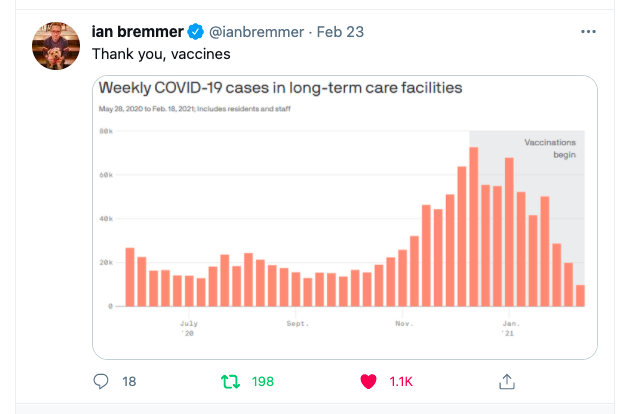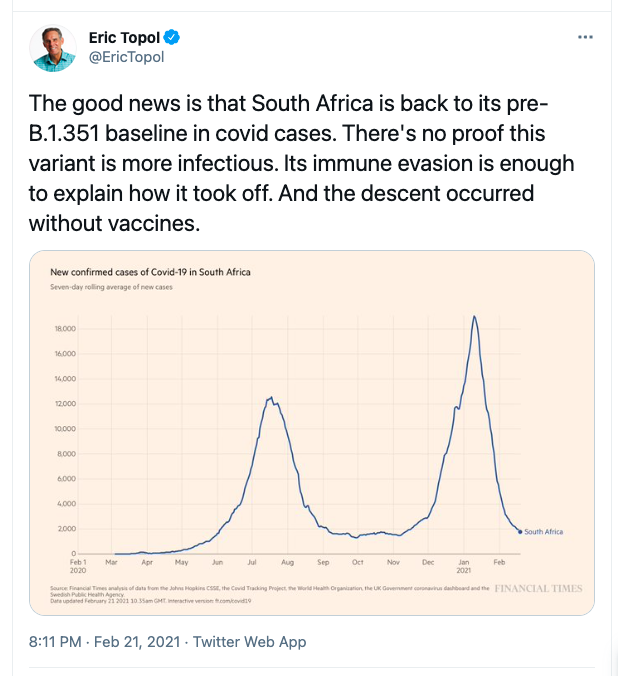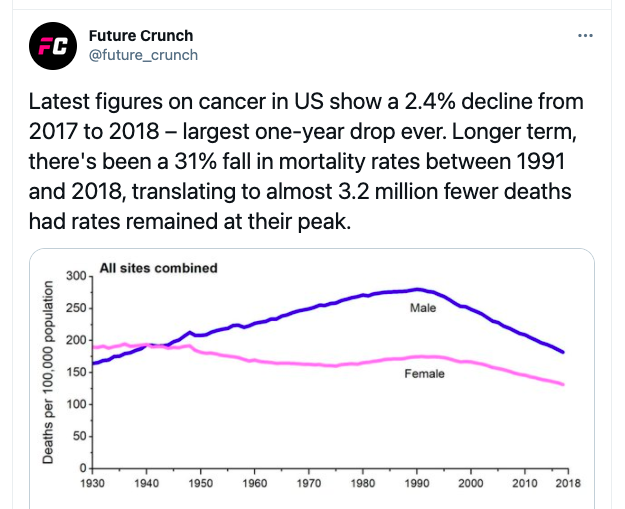Volcanoes are erupting in The Philippines, but on-fire Australia received some welcome rain. The Iran war cries have been called off and The Donald’s military powers are about to be hamstrung by the Senate. Meanwhile, his impeachment trial is starting, and we’re all on Twitter for a front-row seat.
The Antidote to Extremism
The vaccines are coming, and an amazing summer is on the way! Plus cancer progress and how to combat misinformation and extremism.
This is an extract from our now-weekly newsletter, What Could Go Right? Sign up here to receive it in your inbox every Thursday at 6am. You can read the full newsletter here.
The vaccines are coming! The vaccines are coming!
Really, though. Weekly shipments in the US are rising again, to 14.5 million. Two more efficacious Chinese vaccines have been announced and AstraZeneca’s Chinese partner is preparing to manufacture millions of doses, which is all potential good news for global vaccine distribution. It’s hard to resist—not that we should—this much-passed-around Atlantic article that anticipates an “amazing” summer. As we await the amazingness, for those of us hitting pandemic walls, here are 10 ways to cope. (Shoutout to #6: balance your news consumption with positive stories.)
As for the FDA, we can’t quite give them an A+ grade, waiting as we still are on US AstraZeneca approval. But they get credit for soon allowing the Pfizer vaccine to be stored at normal temperatures, which will open up additional, smaller facilities, like doctors’ offices, to administer shots. They are also not requiring booster shots for variants to pass large clinical trials, which means that there won’t be any delay in distribution once the boosters are available. Now if we could get them to greenlight the “pooling” of leftover Pfizer and Moderna doses, a common process that FDA regulations currently do not allow, we’d be pretty happy.
Still, it’s hard not to smile when we see graphs like this one:

Or this one:

And then there’s this COVID-unrelated one, courtesy of our friends at Future Crunch. Fewer people are dying from cancer? Who knew.

How do we create a society that isn’t susceptible to misinformation? Faisal Saeed Al Mutar, a TPN Member and the founder of Ideas Beyond Borders (IBB), is attempting to do just that in one of the world’s most circumscribed information landscapes: the Middle East.
There is a joke, Faisal told us, about the Arabic Internet: it’s “cooking and extremism.” Faisal grew up in Iraq under the regime of Saddam Hussein and became an activist as a teenager. Because he could read English, he says, he was able to access a wealth of mind-opening ideas on the Internet that others weren’t exposed to, since less than 1% of online content exists in Arabic. IBB translates Wikipedia articles and books, creates anti-conspiracy, anti-misinformation content that reaches millions of eyeballs, and is now embarking on new projects like the rebuilding of libraries destroyed by terrorist groups.
“The Middle East is the story of what happens,” Faisal said, “when it all goes over the top.” Faisal shared with us what lessons the US can learn from the highly polarized societies of the Middle East and why apocalypse ideology creates a fertile environment for extremism in our new interview with him.
From us: Last chance to join us today at 10:30am ET with Penny Abeywardena and Richard Florida as we discuss the future of cities! Register—it’s free—here.
We’ve been hearing for years about the damage humanity has done to our world and the coming climate apocalypse. There’s no denying that climate change is a real and significant issue. But is the narrative of inevitable climate catastrophism accurate, and is it doing us any good? Join us on March 11 for Maybe We’re Not F*cked, a conversation with Ted Nordhaus, cofounder of The Breakthrough Institute, and Bina Venkataraman, former senior climate change advisor in the Obama White House, for an unusually uplifting climate conversation.


